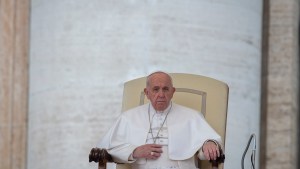“The cry of the victims of the mafia” must elicit a commitment from theologians in the Mediterranean Basin. Pope Francis makes this point in a video message addressed on the occasion of the opening of the 2024-2025 academic year of the Faculty of Theology in Sicily.
The Argentine pontiff visited Palermo in September 2018 to pay tribute to Fr. Pino Puglisi, murdered by the Mafia in 1993 and beatified in 2013.
Referring to John Paul II’s visit to this Palermo university on November 21, 1982, the Pope mentions the main “challenges that the Mediterranean poses to theology.”
In particular, he stresses the importance of ecumenical and interreligious dialogue, “the defense of human dignity in the Mare nostrum [a Latin term for the Mediterranean, literally “Our ocean”, editor’s note], often rendered monstrum by the logics of death,” the strength of popular religiosity, and “the cry of the victims of the mafia.”
The example of witnesses and martyrs
Mentioning the “great witnesses and martyrs” of the fight against the mafia in Sicily, such as Blessed Fr. Pino Puglisi, Judge Rosario Livatino, and magistrates Paolo Borsellino and Giovanni Falcone, the Pope emphasizes that “the proclamation of the Gospel requires a commitment to promoting justice, overcoming inequalities, and defending innocent victims, so that the Gospel of life may always shine forth and evil may be rejected in all its forms.”
“I would like the Faculty to initiate processes of theological and social research on forgiveness, at the crossroads of legality, resistance, and holiness,” explains Pope Francis, who visited Sicily on September 15, 2018.
He invites this institution to “creatively develop a genuine theological and social laboratory of forgiveness, for a true revolution of justice.”
In line with his letter published last summer on the importance of literature in formation, Francis also invites theologians to take into account “the resource of literature to save people’s cultural dignity.” For Francis, theology must help to “create networks of salvation and love, to generate a new history, rooted in the history of the people.”



